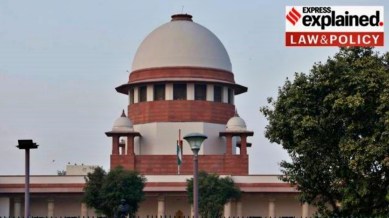As Assam faces Supreme Court heat, why deporting 63 ‘foreigners’ is easier said than done
The SC hearing focused on the status of 63 of the 270 inmates of the Matia “transit camp”. State officials say the 63 have not divulged their nationality or address. This poses a unique problem.

As the Supreme Court questions the status of individuals deemed foreigners and currently placed in a detention camp in Assam, state officials, lawyers working on citizenship cases, and experts in the field told The Indian Express that deporting such persons is easier said than done.
The hearing in the apex court on Tuesday focused on the status of 63 of the 270 inmates of the Matia “transit camp” – the designated detention camp for “illegal foreigners” in Assam. In December, the court had granted the state government time to file an affidavit explaining the reasons for detaining the 270 individuals there and the steps taken for their deportation.
On Tuesday, the court rapped the state for not initiating the process of deporting 63 individuals who have been declared foreigners by Foreigners Tribunals on the ground that their addresses are unknown.
Who is at the camp?
A break-up of individuals at the camp accessed by The Indian Express shows two categories of “foreigners” among the 270 inmates. There are 103 Rohingya people, 32 Chin people and an individual from Senegal who had been referred to sessions courts where they were sentenced and convicted for violations of the Foreigners Act, the Citizenship Act and the Passports Act. These individuals are citizens of other countries, and after completing their sentences in prisons, they have been placed in the “transit camp” while awaiting deportation.
The rest of the 133 inmates have been declared “foreigners” by Foreigners Tribunals in Assam – quasi-judicial bodies that determine whether or not a person presented before them is an Indian citizen. The tribunals receive two kinds of cases – those referred to them by the border police when they suspect someone of being a foreigner and those related to people listed as “doubtful” voters in electoral rolls.
According to a senior Assam government official, 70 of these 133 declared foreigners have “admitted to being Bangladeshi nationals” and have shared addresses in Bangladesh. Another individual has been released on bail. However, the 63 people who the Supreme Court referred to have not shared an address.
The challenges
“The process of deportation is a diplomatic issue and a central government matter. The role of the state government is limited to referring the matter to the Ministry of External Affairs,” said an official.
“In all these cases, we have to fill a nationality verification status report and send it to the MEA, which sends it to the embassy or high commission of the other country. Once the embassy tells us that the individual is indeed a national of that country and the address is correct, we hand them to the BSF, which takes it up with the paramilitary force of the other country… In all other cases, we have sent the reports to the MEA, but these 63 people have not divulged an address in Bangladesh, where we believe they are from,” said the official.
Following the Supreme Court’s reprimand, the state government is now looking to refer the list of these individuals to the MEA this week by simply filling in “Bangladesh” as the address, said the official.
Taking note of the ambiguity of the situation, the Supreme Court had on Tuesday directed the Union government to inform how it plans to deal with cases wherein the individuals are neither Indian nationals nor is their citizenship status known.
A lawyer working on citizenship cases in Assam pointed to the Foreigners Tribunal process and said, “The only thing a tribunal declares is that the individual is not an Indian. But there is no confirmation from any statutory body or the person themselves that they are from Bangladesh. They do not have confirmed addresses or know where they are from. Which raises the question of how they can be deported or to where, and why the Bangladesh government would accept to receive them,” said the lawyer.
Lawyers also pointed out that many of the 63 individuals in question still have the option to appeal against the tribunals’ decisions in the High Court and the Supreme Court, which could overturn them.
For instance, last year, the Indian citizenship of Rahim Ali had been upheld by the Supreme Court – 12 years after he had been declared a foreigner by a Foreigners’ Tribunal and two years after he had died.
The 63
Three of the 63 people in question in the Matia camp have been under detention for over six years, including two for nearly a decade. The rest have been detained in the course of the last two years. Another 750 “declared foreigners” have been released from detention over the last five years after the Supreme Court in 2020 issued directions to release on bail individuals who had been in detention for over two years.
However, these three individuals have continued to remain in detention because they have not been able to secure the required bond of Rs 5,000 and two sureties.
According to state records, in these cases, either their relatives could not be reached or, in one case, the wife of a detainee told police that she had cut ties with him.
Another lawyer working on citizenship cases in Assam, Sauradeep Dey, said, “The question referred to a Foreigners Tribunal is whether a person is an Indian citizen and they respond with a yes or no. But they (the tribunals) do not have the bandwidth to find out which country’s citizens they are… You want to deport them, but Bangladesh has to accept them; you can’t just send them. In the case of the Rohingya individuals, Myanmar does not accept them as their citizens.”